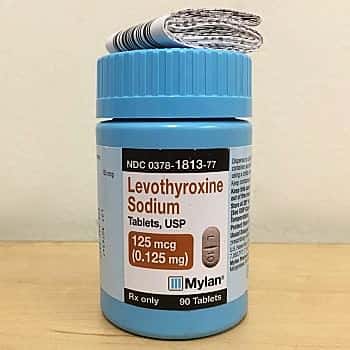
If you take medicine every day, have you checked to see whether you are taking it in the optimal way? Some pills interact with foods, beverages or even supplements. We recently received a question from a reader who read somewhere that walnuts might interact with levothyroxine absorption.
Do Walnuts Affect Levothyroxine Absorption?
Q. You’ve written about the benefits of walnuts. How do they affect people who are taking thyroid meds? I read that walnuts and thyroid medicine are incompatible. Is this true or can I eat walnuts later in the day? I take my 75 mcg of levothyroxine about 5 am.
A. There has been surprisingly little research on this topic, but the Mayo Clinic suggests that patients hold off on eating walnuts for several hours after taking their thyroid medication. In other words, by 9 or 10 am a slice of banana bread with walnuts should not pose any problem for the pill you took at 5 am. However, taking your thyroid medication at breakfast can reduce its absorption (Pharmaceuticals, March 2, 2021).
We don’t know why walnuts might not mix with Levoxyl or Synthroid. Perhaps the fiber in the nuts is the culprit. Or maybe the tannins in the skin of the walnuts gets in the way of absorption. In any event, delaying walnut consumption for a few hours seems to solve the problem.
Iron and calcium supplements also interfere with levothyroxine absorption, as can antacids with aluminum or magnesium, the ulcer medicine sucralfate and the cholesterol-lowering medication cholestyramine. People taking levothyroxine should also wait an hour or so before drinking their morning coffee.
Another reader wonders whether vitamin pills block absorption of levothyroxine (T4). In some cases, the answer is yes.
Could Vitamin Pills Block Absorption of Thyroid Hormone?
Q. A friend told me recently that some vitamin formulations may interfere with thyroid medication. I take 125 micrograms of levothyroxine. Sometimes I take my thyroid pill with my cereal and milk, coffee, juice and vitamins. Would any of that change the effectiveness of my thyroid replacement?
Breakfast May Cause Problems for Levothyroxine Absorption:
A. It is entirely possible that your breakfast routine is interfering with your thyroid medication. First of all, if your multivitamin contains calcium, iron and/or magnesium, those minerals could block adequate absorption (Clinical Therapeutics, Feb. 2017).
Gastrointestinal problems such as celiac disease, lactose intolerance and gastritis may also keep people from absorbing the full dose of Synthroid or other levothyroxine. If you take drugs to treat your digestive distress, such as proton pump inhibitors, those could also interfere with T4 absorption in some cases (Clinical Endocrinology, Jan. 2015).
In addition, milk, yogurt, or calcium-fortified orange juice could impede thyroid absorption (Thyroid, April 2018). Finally, coffee can reduce the amount of thyroid that gets into the blood stream (Thyroid, March, 2008).
How to Improve T4 Absorption:
Not all vitamin pills block absorption of levothyroxine, however. Vitamin C (500 mg) taken at the same time can improve absorption, particularly in people with digestive difficulties (Journal of Clinical Endocrinology and Metabolism, June 2014).
When You Take Your Pills:
You might do better taking your thyroid medicine at least two hours before or after breakfast. Some people prefer to take their levothyroxine at bedtime, at least two hours after eating the evening meal (Archives of Internal Medicine, Dec. 13, 2010). Have your doctor monitor your blood levels carefully, since changing your routine may impact your thyroid requirement.
How You Store Your Pills:
Your physician might not ask you where you keep your tablets. Italian clinicians found that some patients having trouble normalizing their dose were storing their levothyroxine where it could be adversely affected by heat, light or moisture (Frontiers in Endocrinology, July 10, 2017).
Learn More:
We offer many more details about treating thyroid disorders in our eGuide to Thyroid Hormones. Moreover, you may wish to listen to our interviews with Dr. Antonio Bianco and chiropractor Marianne Teitelbaum. It is Show 1196: What to Do If Thyroid Treatment Doesn’t Work for You.
Citations
- Wiesner A et al, "Levothyroxine interactions with food and dietary supplements-A systematic review." Pharmaceuticals, March 2, 2021. DOI: 10.3390/ph14030206
- Skelin M et al, "Factors affecting gastrointestinal absorption of levothyroxine: A review." Clinical Therapeutics, Feb. 2017. DOI: 10.1016/j.clinthera.2017.01.005
- Irving SA et al, "Drugs that interact with levothyroxine: An observational study from the Thyroid Epidemiology, Audit and Research Study (TEARS)." Clinical Endocrinology, Jan. 2015. DOI: 10.1111/cen.12559
- Chon DA et al, "Concurrent milk ingestion decreases absorption of levothyroxine." Thyroid, April 2018. DOI: 10.1089/thy.2017.0428
- Benvenga S et al, "Altered intestinal absorption of L-thyroxine caused by coffee." Thyroid, March, 2008. DOI: 10.1089/thy.2007.0222
- Jubiz W & Ramirez M, "Effect of vitamin C on the absorption of levothyroxine in patients with hypothyroidism and gastritis." Journal of Clinical Endocrinology and Metabolism, June 2014. DOI: 10.1210/jc.2013-4360
- Bolk N et al, "Effects of evening vs morning levothyroxine intake: A randomized double-blind crossover trial." Archives of Internal Medicine, Dec. 13, 2010. DOI: 10.1001/archinternmed.2010.436
- Benvenga S et al, "Refractory hypothyroidism due to improper storage of levothyroxine tablets." Frontiers in Endocrinology, July 10, 2017. DOI: 10.3389/fendo.2017.00155

